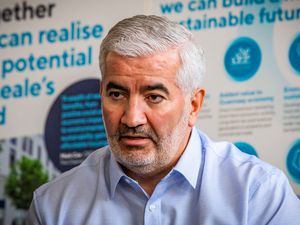<Headline>
Matt Falla, head of private banking, Guernsey, SG Kleinwort Hambros Bank (CI) talks about his experience of mental health and how we can together make a positive difference at home and in the workplace

What is your experience of mental health and wellbeing?
Up to last summer, I had suffered bouts of stress, anxiety and depression which culminated in me being signed off work for four months. Looking back, I can now identify the catalyst as being a series of stressful events in my personal and work life; such as moving to Guernsey with my family to undertake a new role in a new office, the birth of our daughter, the loss of our son early in pregnancy and our home in Jersey flooding. With hindsight, I didn’t pause during these periods to reflect on the impact they were having on my well-being. I felt ok, so I must be ok. However, each drained my mental resources until there was nothing left. I was unable to sleep, think, work or communicate. My brain essentially shut down.
Yet this time also marked the start of my recovery, which arguably would not have occurred without such a crash. With time and the right support, it proved to be the start of the rest of my life. I was forced to make positive, meaningful changes to my mindset, fitness, outlook and priorities that I believe have made me a better husband, father, friend and colleague today.
What insights has that experience given you when it comes to how to do business better both for colleagues and clients?
With both, I have been very open about my mental health and the causes and I have been surprised by how many have also experienced periods of suffering and in turn offered me their invaluable support.
Arguably these types of conversations would not have happened in the past. But the world is changing and the subject of mental health is no longer taboo.
Historically strength was viewed as the absence of fear, but now I believe it starts with admitting your own vulnerability. This honesty of who we really are leads to a far deeper, emotive connection with colleagues and clients, creating an environment of psychological safety and trust for all.
By talking and sharing your experience, that will help others. How important is that we talk about mental health, and that it affects everyone?
It’s vital. It’s normal. We all have mental health and everyone’s benchmark to what ‘good’ feels like is unique. There is also a misnomer that men especially don’t like to talk about their feelings. In my experience that’s not always true. An issue with my poor mental health was that it didn’t simply arrive one day out of the blue. It developed and deepened in waves over most of my adult life. Hence, I got used to living with it, covering it up at its worst with a mask of smiles and jokes. Thus, to have a conversation about how I was really feeling with those closest to me, would have been a direct contradiction to the person they thought I was. I would have shattered the illusion. The main turning point in my recovery was my wife discovering Man Club and attending my first meeting. I immediately met a group of amazing individuals who ‘got it’. Men who were or had suffered and understood what it can feel like. I felt like I could be truly honest about how I felt for the first time in several years, without judgement. Members started out as strangers, but quickly became close friends. The group also gave me hope that this period would pass, which it did. I am now honoured to be a Man Club Facilitator and helping men on their own journeys.
Also that leaders, in fact anyone in all walks of life, can experience mental ill-health? And can manage their conditions, and still keep their jobs and ongoing success? That there is light at the end of dark tunnels - giving hope to people?
Hope is key and at its worst my depression was the absence of hope. It wasn’t sadness, as the name seems to indicate, but a joyless void of despair. It didn’t matter that I had the love of my amazing wife, had the most beautiful, healthy two children and a good career. That almost made the feelings worse, as how could I feel like this with all of that. Poor health, physical or mental, can be indiscriminate as I think the last few months have clearly shown.
Yet there is a large proportion of our society that lives with poor mental health daily. They look after their loved ones, hold down difficult jobs and continue to function despite carrying the weight of their turmoil on their shoulders. I’m always inspired by thinking what they could also achieve if that weight no longer existed.
It is essential that the right support is provided and accessible by those that need it, when they need it.
Do you do anything different to what you do now? Both in terms of self-care, support for colleagues and clients?
It’s probably fair to say that I do most things differently now! Personally, I ensure that I put my well-being first. However selfish that sounds and feels, I know that I am a better person for it. I exercise now for sanity, rather than vanity! After almost 45 years of being an islander, I have also discovered the pure joy and benefits of the sea, the colder the better! Ultimately, I seek to take pre-emptive care of myself, nurturing before I feel I need to.
For colleagues, I try and maintain an environment that balances their personal needs and life outside of work, with the objectives of the business. Work has varying importance to different people for many reasons, and we should embrace that.
With clients, it’s trying to understand their personal motivations and emotional needs, their ‘why’ in essence.
How Kleinwort has been an exemplar employer - how has it supported you?
Initially the bank provided me with the time and space to get better. There is no normal when it comes to mental health and recovery and arguably the more you focus on reaching it, the more elusive it becomes.
They say a year is a long time in politics, but it seems an eon in mental health and it’s very encouraging to see how far some businesses have come in not only normalising the struggles that many of us have, but also actively seeking to prevent them. The primary focus for Kleinwort Hambros during the recent pandemic was the well-being of our staff, both physical and mental.
KH have launched several initiatives based around our Culture & Conduct that focus on Well-Being, Diversity and Life@Work. The bank has also partnered with Unmind, an online and confidential platform to help you proactively look after your mental health.
How big a challenge is mental health and wellbeing in the workplace, do you feel?
I see it more as an opportunity, being something that all employees have and, in most cases, it can be improved. It is well documented that spend on wellbeing delivers a 400-900% return on investment*, levels that are impossible to find in business. Benefits are seen in reducing absenteeism and presenteeism, whilst improving morale, productivity and the reputation of the business.
But it is a challenge and a leap of faith. The benefits don’t appear immediately on a profit and loss statement, whilst the cost does. However, it is the right thing to do and the least we can do for our valued team members. It should form the foundation of strategic direction, rather than a social acceptable add-on to a website or mission statement.
When it comes to making a positive difference and change, what is the role of leaders in effecting that?
I think it’s best summed up by the author Simon Sinek: ‘We are drawn to leaders and organisations that are good at communicating what they believe. Their ability to make us feel like we belong, to make us feel safe and not alone is part of what gives them the ability to inspire us.’
*Deloitte UK, Mental health and employers: The case for investment, 2017





